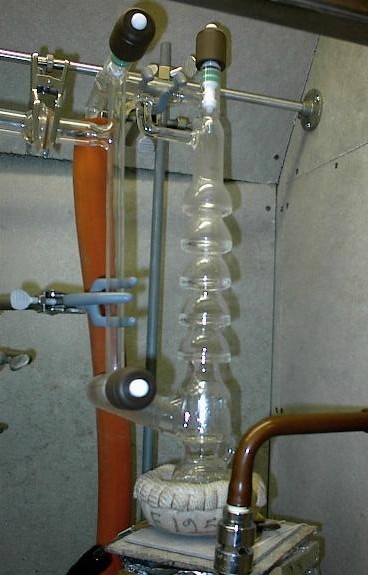
DMT-Nexus member
Posts: 1104 Joined: 11-Feb-2017 Last visit: 18-Jan-2021
|
I would like to use an electric pump for vacuum filtration and (vacuum) distillation; mostly to recycle solvents (some have a higher boiling point hence the need for vacuum). I saw some people use these diaphragm pumps to cycle water through the cooler and perhaps also to create vacuum (with an addition of water aspirator):  The pumps come with different specs, usually pumping around 5L per minute which seems to me too much of a flow for a simple cooler (I am afraid it could break it). The specs also says the pressure is some 100 psi which is also seems to much for a brittle glassware. My questions: - What are good pump specs for aspirator to get a decent vacuum and sufficient flow in the condenser? - I guess I can use a single pump for both the condenser and for creating vacuum (by attaching aspirator on the water outlet). - Is it possible to regulate flow/pressure with these pumps? Perhaps using some valves or current regulators? Sorry for asking basic question in the forum but I asked on YT discussion boards but the authors are too busy to answer and I have nowhere else to ask.
|
|
|
|
|

Boundary condition

Posts: 8617 Joined: 30-Aug-2008 Last visit: 24-Dec-2025 Location: square root of minus one
|
Well, an aquarium filter pump will do the job of pumping coolant for condensers. These have a small centrifugal pump and an inlet restrictor for flow control. These definitely work for various glassware condensers. The pump pictured could be controlled with a bleed valve or used as a lift pump for a gravity fed tank which could then supply both the aspirator and the condenser with a largely constant pressure according to the head of water chosen. “There is a way of manipulating matter and energy so as to produce what modern scientists call 'a field of force'. The field acts on the observer and puts him in a privileged position vis-à-vis the universe. From this position he has access to the realities which are ordinarily hidden from us by time and space, matter and energy. This is what we call the Great Work." ― Jacques Bergier, quoting Fulcanelli
|
|
|

DMT-Nexus member
Posts: 231 Joined: 04-Mar-2017 Last visit: 26-Feb-2019 Location: West Coast, BC
|
Aquarium pumps are perfect for your condenser's water flow.
I don't know much about the vacuum, but if you have the glassware, you could have a boiling flask sitting in another glass bowl or whatever, so that it is set up like a double boiler - that contains a high boiling point oil, instead of water, and have the heat source underneath that, and you will be able to reach a higher temperature than 100 Deg C.
Hope this helps.
|
|
|

DMT-Nexus member
Posts: 100 Joined: 04-Nov-2017 Last visit: 28-May-2019 Location: Nexico city
|
I think you need 2 pumps, 1 for your condenser cooling reservoir - an aquarium water pump - 1 pump for your vacuum. I use a rio 600 for cooling, I had from my hydro grow days, probably 6-11 $ A 12volt 4liter per minute pump with a 100psi cut off pressure for aspirator vacuum, stainless steel aspirator about $10. I learned this from 'Nurd Rage" on youtube. Good video he lowers air pressure enough to boil water at room temp? I think pretty low. I am going to distill some d-limonene to recycle and this is how I'm going to go. Pump cost $20 US or so oh yea a 12 volt pump good for vac filtration cost like $6 each good pump so far, pumps gases , water , oil. pump or vac depending how you attach hoses hope this helps permatrip attached the following image(s):  pumps 004.JPG (2,780kb) downloaded 417 time(s). pumps 002.JPG (3,465kb) downloaded 415 time(s). pumps 003.JPG (2,815kb) downloaded 416 time(s).put your hands in my hand and together we will take on all the world
|
|
|

DMT-Nexus member
Posts: 1023 Joined: 19-Mar-2016 Last visit: 07-Apr-2024
|
You can use pretty much any vacuum pump you find if its not too strong. Cheap chinese vacuum pumps work well enough but dont give much accuracy and break down fast.
|
|
|

dysfunctional word machine

Posts: 1831 Joined: 15-Mar-2014 Last visit: 26-Mar-2025 Location: at the center of my universe
|
For cycling coolant through condensers, use a submersible aquarium pump. Anything with more power than that is overkill and adds the risk of blowing the tubing off of the condenser barbs, long before it could shatter the glass from overpressure.
For pulling a vacuum for the purpose of filtration or distillation, use either a chemically resistant vacuum pump (pricey things) or feed a venturi pump with a submersible fountain pump in a closed circuit. A fountain pump is both able to deliver sufficient pressure and flow to the venturi. Try to make sure that any bubbles coming from the venturi exhaust stream aren't getting sucked up again by the fountain pump, because that creates vacuum fluctuations, which you want to avoid in vacuum distillations.
Both for the coolant pump and for the venturi pump I strongly recommend using a submersible pump. Spills and accidents will happen and usually mixing electricity and water is not a good idea. Regular aquarium pumps and fountain pumps are water proofed by design and thus reduce these risks.
I also recommend against using a simple and cheap membrane pump for vacuum filtering. Filtering flasks do sometimes overflow when you aren't paying attention and even if not, there is often substantial spray being sucked into the vacuum line and into the pump. Cheap pumps do not like it in the long run. A venturi pump will simply discharge the overflow and spray into the water stream and dilute it. Most fountain pumps are quite robust and deal with this without problems. Clean the water regularly anyway, because micro-organisms will colonize the water after a while and turn it slimy and yucky.
|
|
|

DMT-Nexus member
Posts: 100 Joined: 04-Nov-2017 Last visit: 28-May-2019 Location: Nexico city
|
I like to use a vacuum trap to prevent back flow into a vac pump. I found this short video by Nurd Rage to be interesting, thought maybe someone else might enjoy it and maybe be of use to them. I would be interested in others opinions as I really want to learn. I would use a round bottom flask instead of an erlenmyer but his distillation demo did work and educate. https://www.youtube.com/watch?v=tYLlkTDstmoput your hands in my hand and together we will take on all the world
|
|
|

DMT-Nexus member
Posts: 1104 Joined: 11-Feb-2017 Last visit: 18-Jan-2021
|
pitubo wrote:For cycling coolant through condensers, use a submersible aquarium pump. Anything with more power than that is overkill and adds the risk of blowing the tubing off of the condenser barbs, long before it could shatter the glass from overpressure. I agree a low power pump is all that is needed for cycling a coolant. Aquarium pumps are super cheap, waterproof by default and come with a power source. At 3:26 you can see NurdRage uses the 5L/min pump for vacuum and the glassware seems just fine, achieving pressure difference of 70 mBar (52.5 Torr): I don't need vacuum now, but rather high temperatures are needed for distilling, say, toluene. Toluene boils at 111 C (231.8 F) so an oil bath would do. I don't think I will need to distill anything under vacuum, except maybe for sulphuric acid, that is hard to obtain (only as battery acid that has to be distilled before use in extractions). I also wanted vacuum source for filtration and posibly drying. It may be also nice to attach a pressure gauge to the line so one can estimate the lower boiling point for correct distillation. permatrip wrote:I would use a round bottom flask instead of an erlenmyer but his distillation demo did work and educate. Yes I found nice cheap GL45 screw caps for flasks, having 2 attachments for hoses. This will make the vapor trap.
|
|
|

DMT-Nexus member
Posts: 1104 Joined: 11-Feb-2017 Last visit: 18-Jan-2021
|
Okay I've got Newa Micro-Jet immersible aquarium pump and it works wonderfully! Even though the pump is really small. It has enough power to cycle whole condenser in a few seconds. 
|
|
|

DMT-Nexus member
Posts: 1104 Joined: 11-Feb-2017 Last visit: 18-Jan-2021
|
Just a small update. I have built the vacuum pump using the following items:
- self-priming water pump (6L/min, 12V/6A i.e. 70W) (eBay)
- 84W DC source (LED lighting supply), it's better than 70W for longer operation on full power
- DC connector (LED lighting supply)
- DC power switch (LED lighting supply)
- metal vacuum aspirator (eBay)
- tubing
It works but the vacuum is very weak (only up to 100 mmHg). I found the aspirator leaks air and it's actually a sh*tty one according to ScienceMadness forum. It's plastic sealing on screw holes is not very good.
I will try a new one-piece PP aspirator from lab supply and report back.
|
|
|

DMT-Nexus member
Posts: 1104 Joined: 11-Feb-2017 Last visit: 18-Jan-2021
|
Okay I bought a higher quality aspirator (see picture) and the vacuum is now almost 200 mmHg (compared to 100 mmHg of the eBay one). Now that I was looking for the picture, I found vendor page stating this aspirator is designed to reach 191.5 mmHg. I thought the vacuum is driven by the pump (flow rate) and vapour pressure of the liquid, not being limited by the aspirator itself. NurdRage (a YouTube chemist) was able to reach much higher vacuum with the cheap steel aspirator from eBay and with even weaker diaphragm pump than mine. Should I look for yet another aspirator? I need higher vacuum for distilling high boiling point liquids, drying molecular sieves and filtration but don't want to invest in expensive rotary pumps (overkill). blue.magic attached the following image(s):  waterjetpump.jpg (5kb) downloaded 237 time(s).
|
|
|

DMT-Nexus member
Posts: 377 Joined: 19-Aug-2017 Last visit: 15-Jan-2021
|
In your search did you come across any schematics for particularly good aspirators? As you said, the consensus is that the metal units on ebay are low tolerance sloppy things that dont perform nearly as well as the one NerdRage used. I dont have much money, but I do have a fully equipped machine shop and I'd love to see the design someone would use if they could get custom precision machine work done for free. I can build things I could never afford to buy  I know the basic design is like this: Elrik attached the following image(s):  venturidiag.jpg (15kb) downloaded 197 time(s).
|
|
|

analytical chemist
   
Posts: 7463 Joined: 21-May-2008 Last visit: 09-Aug-2025 Location: the lab
|
you’re likely not going to get decent vac for high-boiling solvents from an aspirator. it’s good for light-duty work, like vacuum filtration. I used one to degas mobile phases. I have one of these rotary vane pumps, and there are others for less than what I spent on a diaphragm pump ($150). you’ll also need a flow-control (“needle” )valve. I have this one by VAT  If you go with RV, you'll need to observe KF/NW convention, ex. KF-16, KF-25, etc. this describes the standardized dimensions for flange fittings and O-rings. otherwise, a diaphragm pump is the most practical option. "Nothing is true, everything is permitted." ~ hassan i sabbah
"Experiments are the only means of attaining knowledge at our disposal. The rest is poetry, imagination." -Max Planck
|
|
|

DMT-Nexus member
Posts: 1104 Joined: 11-Feb-2017 Last visit: 18-Jan-2021
|
benzyme wrote:you’re likely not going to get decent vac for high-boiling solvents from an aspirator. it’s good for light-duty work, like vacuum filtration. I used one to degas mobile phases. I have one of these rotary vane pumps, and there are others for less than what I spent on a diaphragm pump ($150). I have finally ordered a (hopefully) decent diaphragm pump from Carl Roth. It is capable of achieving very good vacuum (100 mbar) which exceeds my current needs. It has a Teflon(tm) membrane and is aimed on general use incl. distillations, rotavaping and filtration. The great thing is that it alread has a pressure adjustment valve and pressure gauge so I don't have to buy one (yay!). Another candidate was one of the KNF pumps, but they lacked the valve and were a bit more expensive. blue.magic attached the following image(s):  rotilabo.jpg (7kb) downloaded 181 time(s).
|
|
|

analytical chemist
   
Posts: 7463 Joined: 21-May-2008 Last visit: 09-Aug-2025 Location: the lab
|
the Gast vac/pressure pumps are indestructible. I’ve seen them in academia, hospitals, dentists, and analytical labs. they’re cheaper than KNFs (probably because they’re made in Benton Harbor, MI), and pull the same vacuum. no maintenance required. the DOA-P104AA has reg valves and gauges. that one look decent too. you’ll definitely be better served with a diaphragm than an aspirator. "Nothing is true, everything is permitted." ~ hassan i sabbah
"Experiments are the only means of attaining knowledge at our disposal. The rest is poetry, imagination." -Max Planck
|
|
|

Boundary condition

Posts: 8617 Joined: 30-Aug-2008 Last visit: 24-Dec-2025 Location: square root of minus one
|
If you like glass blowing, this is worth a look: “There is a way of manipulating matter and energy so as to produce what modern scientists call 'a field of force'. The field acts on the observer and puts him in a privileged position vis-à-vis the universe. From this position he has access to the realities which are ordinarily hidden from us by time and space, matter and energy. This is what we call the Great Work." ― Jacques Bergier, quoting Fulcanelli
|
|
|

analytical chemist
   
Posts: 7463 Joined: 21-May-2008 Last visit: 09-Aug-2025 Location: the lab
|
very interesting  Idk about working with Hg to that extent though, I'm such a clutz. I've always like the idea of oil diffusion pumps, though they're probably overkill too.  "Nothing is true, everything is permitted." ~ hassan i sabbah
"Experiments are the only means of attaining knowledge at our disposal. The rest is poetry, imagination." -Max Planck
|
|
|

analytical chemist
   
Posts: 7463 Joined: 21-May-2008 Last visit: 09-Aug-2025 Location: the lab
|
I have one of these https://www.ebay.com/itm...6337b:g:ME4AAOSwzFBbTC5EI busted one of the gauges on mine, but it still works fine for rotary evaporation. I also use it to put air in my Pirellis  "Nothing is true, everything is permitted." ~ hassan i sabbah
"Experiments are the only means of attaining knowledge at our disposal. The rest is poetry, imagination." -Max Planck
|
|
|

DMT-Nexus member
Posts: 1104 Joined: 11-Feb-2017 Last visit: 18-Jan-2021
|
downwardsfromzero wrote:If you like glass blowing, this is worth a look I love Cody's Lab, though I don't have such affection to mercury as him 
|
|
|

Boundary condition

Posts: 8617 Joined: 30-Aug-2008 Last visit: 24-Dec-2025 Location: square root of minus one
|
I just built a suction pump, or rather adapted one from a (salvaged) tyre pump. It's suitable at the very least as a filtration pump. Further tests will follow, including distillation. It's completely ghetto tech. Basically, I drilled out the air inlet and screwed a bicycle tyre valve in as the suction nipple. Cost: 2 hours of my time.  Photo's will follow shortly. Edit: here's one.  Cover on, testing with 25% acetic acid through a small frit:  It looks as though the pressure gauge can be re-purposed as a pressure/vacuum gauge, too  “There is a way of manipulating matter and energy so as to produce what modern scientists call 'a field of force'. The field acts on the observer and puts him in a privileged position vis-à-vis the universe. From this position he has access to the realities which are ordinarily hidden from us by time and space, matter and energy. This is what we call the Great Work." ― Jacques Bergier, quoting Fulcanelli
|